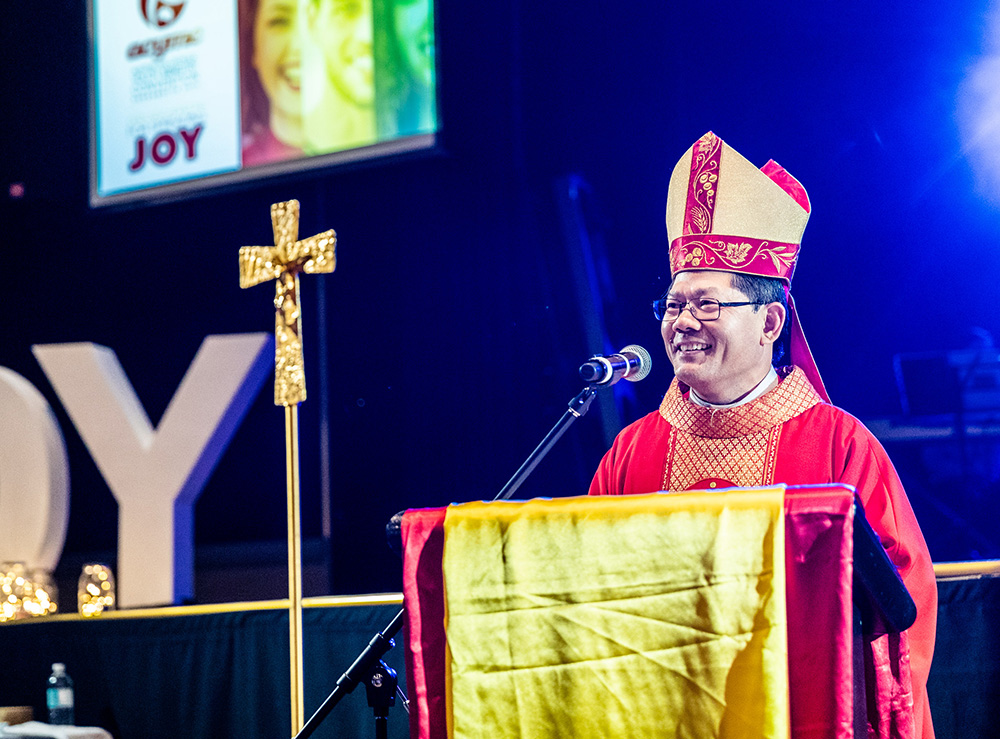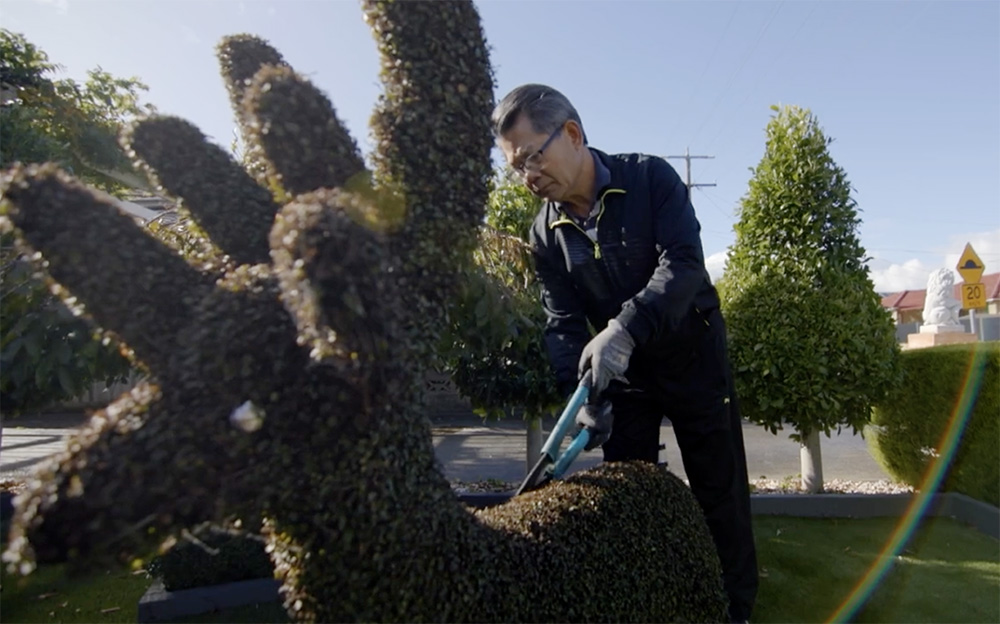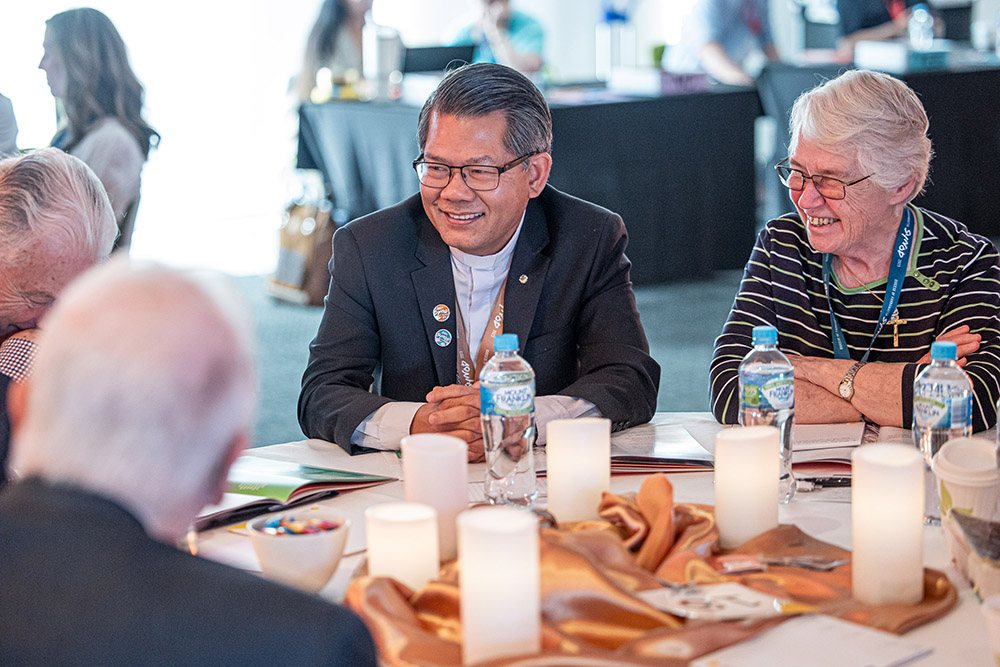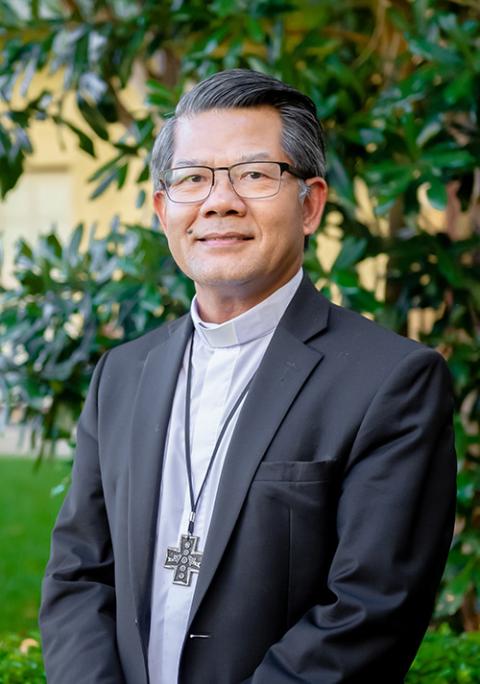
Bishop Vincent Long of Parramatta, Australia (Courtesy of Parramatta Diocese)
As more than 200 delegates participating in the first-ever synod for the Australian Diocese of Parramatta filed out of their opening Mass, they were discreetly given flyers by those questioning both the meeting and the bishop who had called it.
Since his installation as the head of the diocese in the western suburbs of Sydney in 2016, Bishop Vincent Long has ruffled more than a few feathers for his support of LGBTQ Catholics, his advocacy in support of the country's recent referendum on Indigenous representation, and his own personal testimony of being a victim of clergy sexual abuse.
For taking those stances, Long is unapologetic.
"I try to follow Pope Francis' lead by focusing on pastoral priorities such as a church that is more inclusive, participatory, open to the gifts of all members, especially women," he told NCR on Nov. 8. "More aligned with the poor, the dispossessed and the marginalized, more in partnership with others, more engaged with the world not flight from or hostility against it."
To be clear, Long says he does not want to compare himself with the pope, but that he is simply trying to draw from what Francis is teaching and apply it in his own backyard.
Advertisement
"The pope has had many critics both within and outside the church. I have my share. But I would not compare myself with him. ... This comes with the territory," he said.
Long's remarks came during an interview with NCR on the sidelines of the plenary meeting of the Australian Catholic Bishops' Conference at Mary MacKillop Place in Sydney, and while this reporter was in the country for a series of lectures sponsored by the Parramatta Diocese, the La Salle Academy at Australian Catholic University, and Newman College, Melbourne.
Like Francis, Long is somewhat of an outsider.
Ordained an auxiliary bishop of Melbourne in 2011, he is the country's first Asian-born bishop. Now in Parramatta as the first Vietnamese-born bishop to head a diocese outside of Vietnam, he leads one of Australia's most diverse and rapidly growing dioceses and serves as the chair of the Australian bishops' Commission for Social Justice, Mission and Service.
While he began his studies for the priesthood in Vietnam, he, along with several other family members, fled the country on a boat as a refugee in 1979, arriving first in Malaysia and then Australia, where he eventually became a Conventual Franciscan friar. He would go on to serve as superior of the order in Australia and, from 2008 to 2011, serve as an official at its headquarters in Rome.

Bishop Vincent Long of Parramatta, Australia, works in his mother's garden. (Courtesy of Parramatta Diocese)
Long's own background as a refugee, combined with his Fransciscan spirituality that emphasizes a care for creation and the poor, has aligned him closely with this Jesuit pope who chose the 13th-century saint as his namesake.
"I find that synergy between Pope Francis' vision of the church and my own, which was nourished and formed by my Franciscan upbringing," he said, describing "a church of poverty, a church of simplicity, a church of humility."
Long admits that this can be a bit of a shock to the system for some.
"I think I touch some raw nerves that make some react strongly," he said. "Like when I speak for LGBTQI, asylum seekers, Indigenous people."
Short in stature and at times soft-spoken, what Long has to say is often bold and shocking in a country where the late Cardinal George Pell's brash and bullyish-style Catholicism has seemingly cemented the perception of the Australian church for many.
"Some are fearful that the world is not the way we thought it was going to be. I think what has happened is that we've taken all of our anxiety about the old world disappearing," he continued.
Marginalized groups, he said, often "become the scapegoats for all that is wrong."
Aware of these tensions and the fact that the church has to maintain unity in diversity, Long said that soon after he arrived in Parramatta, he decided it would be beneficial to hold a diocesan synod. Those plans were delayed when the Australian bishops decided to hold a national plenary council to discuss a number of proposals regarding church governance.
While the plenary was originally scheduled for 2020, it was not completed until 2022 due to the COVID-19 pandemic.
Reflecting on the decision to hold the plenary, Long described it as a "very bold step on part of the church and the bishops, in particular," knowing that there would be "moments of tension and disruption."
But those moments, he said, were "transformative" and the entire experience served as "a template for the synodal journey" — both for the global church and his diocese, where Long said he felt the need to hold a synod so he didn't just "impose my own wishes."
In the lead-up to the Parramatta synod, Long said, there was apprehension about it further dividing the diocese over hot-button issues, concern about the logistics involved, and worries that it might further exacerbate the divide between the laity and clergy.
"It is like a journey to the unknown," he said, noting that the entire process required vulnerability at every level, with some participants fearing change and others afraid nothing would change.

Bishop Vincent Long attends the Oct. 13-15 synod in the Diocese of Parramatta, Australia. (Courtesy of Parramatta Diocese)
In the end, Long said the entire experience was marked by prayerfulness and that the No. 1 word chosen by delegates in a survey afterward was that they felt "safe."
Moreover, it delivered concrete results and, as Long emphasized, was "not just a talk fest."
Resolutions to welcome LGBTQI persons, increase resources for women's leadership formation, and implement greater outreach and dialogue with Indigenous peoples all passed with a two-thirds majority. Only one proposal to offer an "acknowledgement of country" of Aboriginal lands at the beginning of liturgical celebrations failed to pass.
Long acknowledged that personally, he felt a bit of whiplash, enjoying an emotional high from the momentum of the synod, while at the same time feeling "very flat" over the fact that on the same weekend the synod took place, Australians overwhelmingly rejected a national referendum that would have given greater rights to the country's Indigenous.
But he said he believes that the synod is still showing that the church is moving forward on a journey together to better understand itself and the world in which it operates. The fact that the diocesan synod took place at the same time as the first session of the Vatican's synod on synodality, he said, only added a certain energy to the entire process.
"For me, synodality is a crucial step in the church's self-understanding," said Long. "It takes the reception of the Second Vatican Council to a new level."
"Pope Francis has engaged in an ecclesiological gear shift. Synodality or the whole people of God is what God expects of the church going forward," Long said. "The church cannot be fully itself without the contribution of all the faithful to her mission."









